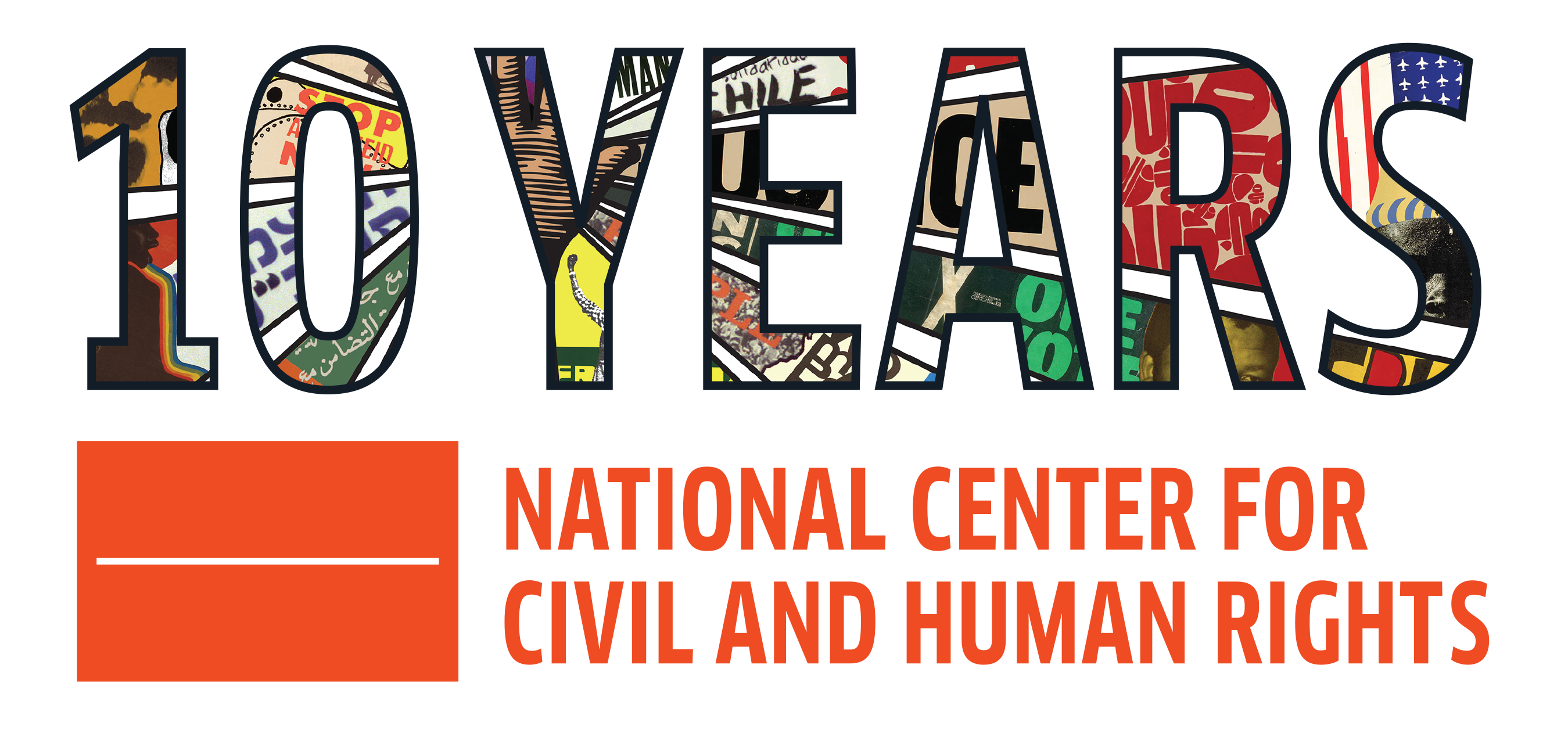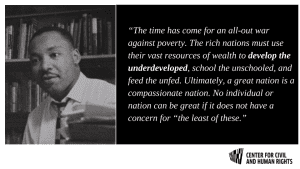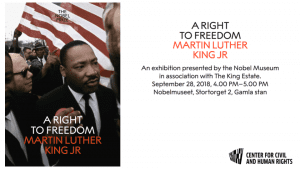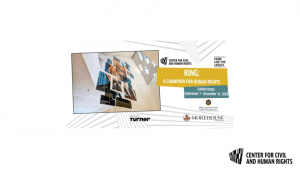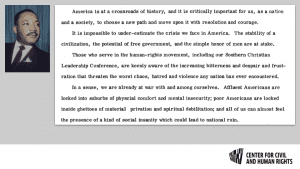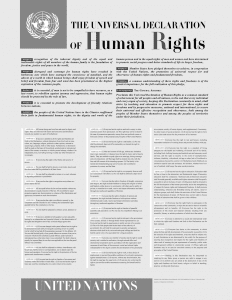The Duty to Respond
I’m Brian Tolleson, Interim CEO at The National Center for Civil and Human Rights and a proud LGBTQ person…and I guess we can add “Guest Blogger” to that.
Yes, it’s just temp job for a former Board member, (maybe the best temp job in the world, in my opinion). But in life, I’m an activist and an entrepreneur who has built and sold media and entertainment businesses. I was a leader of a very small team who launched Logo for MTV Networks, the first ever 24/7 media brand for LGBTQ Americans. And, my business partner from launching Logo and I built and sold the first ever YouTube network for LGBTQ People funded in part by Google Labs. I have made it my personal mission to help give voice to the voiceless for my entire career… and to build businesses that do that. My current venture, Lexicon Strategies, is a communications strategy firm that helps corporations, that have a civic component of their business, generate positive social impact.
I’m very proud to be here to celebrate the 70th Anniversary of The Universal Declaration of Human Rights. The amazing team here at The Center asked me to share some thoughts about the UDHR and I’m honored to do so.
At The National Center for Civil and Human Rights, one of our primary duties is to curate the Morehouse College Martin Luther King, Jr. Collection. In fact, we are the only place on planet Earth where the mind of Dr. King, through his personal papers and writings, is rotated in a permanent exhibition of his work open to the public. And that’s really what I want to share with you today, to bring you some words from Dr. King’s vision that in many ways is a realization of the very ideals underpinning the UDHR.[/vc_column_text][vc_column_text css=”.vc_custom_1538662915330{margin-bottom: 0px !important;}”]Let’s look at 3 of the Articles of the UDHR that I personally feel are interwoven into a powerful statement of fundamental protection- Articles 23-25. I call these “The Rights of working Peoples” and their inclusion speaks boldly to our universal values to be a productive society of humans at work, and for us to protect and respect those who serve.
Article 23
- Everyone has the right to work, to free choice of employment, to just and favourable conditions of work and to protection against unemployment.
- Everyone, without any discrimination, has the right to equal pay for equal work.
- Everyone who works has the right to just and favourable remuneration ensuring for himself and his family an existence worthy of human dignity, and supplemented, if necessary, by other means of social protection.
- Everyone has the right to form and to join trade unions for the protection of his interests.
Article 24
Everyone has the right to rest and leisure, including reasonable limitation of working
hours and periodic holidays with pay.
Article 25
- Everyone has the right to a standard of living adequate for the health and well-being of himself and of his family, including food, clothing, housing and medical care and necessary social services, and the right to security in the event of unemployment, sickness, disability, widowhood, old age or other lack of livelihood in circumstances beyond his control.
- Motherhood and childhood are entitled to special care and assistance. All children, whether born in or out of wedlock, shall enjoy the same social protection.
On December 11th, 1964, sixteen years and one day after the adoption of the UDHR, in the Auditorium of the University of Oslo, Dr. King, in his Nobel Lecture, said:
Now at this moment, 54 years ago, remember… the 1964 Civil Rights Act was less than 6 months old and the country was in the height of civil turmoil. Selma, and many Southern Cities experiencing intense and unprecedented conflict. Bloody Sunday on the Edmund Pettis bridge in Selma, still six months in the future. This was a powerful time when the future of our very society was unclear. And at this moment, Dr. King’s brilliant insight was actually…at that time… a new idea in America. Of course, it was contemplated in the UDHR, but Dr. King was one of the first to demand these specific rights in America for everyone.
I’m going to digress for one second, because I want to remind you of ways you can experience Dr. King’s works yourself as you pursue your hard work. To constantly remind yourselves that you are part of a long road of sacrifice towards true human dignity in our society.
Now, if you happen to be in Oslo, we are proud partners supporting The King Family in an exhibition created by The Nobel Museum which just opened last Friday.
And, of course if you are here in Atlanta, I encourage you to visit both The King Center and The National Center for Civil and Human Rights. At The National Center for Civil and Human Rights we currently have on rotation an exhibition King: A Champion for Human Rights, which I think you will find inspirational as you consider the global effect of the UDHR.
OK, back to my point. The following are several key excerpts from a press announcement from Dr. King, as President of The Southern Christian Leadership Conference… perhaps one of the earliest suggestions of the coming “Poor People’s Campaign”. This was released on December 4th, 1967, exactly 4 months before his assassination on April 4th, 1968. The entire original of this document is on display at The Center until the end of the year, and I encourage you to visit it. I think you will be amazed at how long this arc is, slowly bending towards justice and only with a true commitment by people like you to help bend it.
( December 4th, 1967.) America is at a crossroads of history, and it is critically important for us, as a nation and a society, to choose a new path and move upon it with resolution and courage.
It is impossible to under-estimate the crisis we face in America. The stability of a civilization, the potential of free government, and the simple honor of men are at stake. Those who serve in the human-rights movement, including our Southern Christian Leadership Conference, are keenly aware of the increasing bitterness and despair and frustration that threaten the worst chaos, hatred and violence any nation has ever encountered.
In a sense, we are already at war with and among ourselves. Affluent Americans are locked into suburbs of physical comfort and mental insecurity; poor Americans are locked inside ghettoes of material privation and spiritual debilitation; and all of us can almost feel the presence of a kind of social insanity which could lead to national ruin.
Consider, for example, the spectacle of cities burning while the national government speaks of repression instead of rehabilitation. Or think of children starving in Mississippi while prosperous farmers are rewarded for not producing food. Or Negro mothers leaving children in tenements to work in neighborhoods where people of color can not live. Or the awesome bombardment, already greater than the munitions we exploded in World War II, against a small Asian land, while political brokers de-escalate and very nearly disarm a timid action against poverty. Or a nation gorged on money while millions of its citizens are denied a good education, adequate health services, decent housing, meaningful employment, and even respect, and are then told to be responsible.
The true responsibility for the existence of these deplorable conditions lies ultimately with the larger society, and much of the immediate responsibility for removing the injustices can be laid directly at the door of the federal government.
This is the institution which has the power to act, the resources to tap, and the duty to respond. And yet, this very government now lacks the ‘Will to make reforms which are demanded by a rising chorus across the nation. According to the Harris Poll, for example, a substantial majority of Americans believe that we must proceed at once to tear down and rebuild the slums, and solid majority feel that everyone should have a job. Concerned leaders of industry, civil….rights organizations, labor unions and churches are joining in such groups as the new Urban Coalition to urge progressive economic measures at the national level. Many urban political leaders are ready to carry out enlightened programs if only the federal government will provide the needed financial.
Newsweek magazine recently devoted an entire issue to the problem of racism in America and set forth some sound proposals for dealing with this situation.
….
Unrest among the poor of America, and particularly among Negroes, is growing rapidly. In this age of technological wizardry and political immorality, the poor are demanding that the basic need of people be met as the first priority of our domestic programs. Poor people can not long be placated by the glamour of multi-billion-dollar exploits in space. Poor people who encounter racial discrimination every day in every aspect of their lives can not be fooled by patronizing gestures and half-way promises. Poor people who are treated with derision and abuse by an economic system soon conclude with elementary logic that they have no rational interest in killing people 12, 000 miles away in the name of defending that system.
…
And so, we have decided to go to Washington and to use any means of legitimate nonviolent protest necessary to move our nation and our government on a new course of social, economic, and political reform. As I said before, the power to initiate this reform resides in Washington. The President and the Congress have a primary responsibility for low minimum wages, for a degrading system of inadequate welfare, for subsidies of the rich and unemployment and underemployment of the poor, for a war mentality, for slums and starvation, and racism. The survival of a free society depends upon the guarantee and survival of freedom and equality. This is what we seek.
Please take a moment to read the UDHR , and perhaps take one phrase in particular from what we just read from Dr. King with you in your work, because I think it’s meaningful. “The power to act, the resources to tap, and the duty to respond”. I think that’s you and me and all of us no matter who we are.
Stand up for your rights, and the rights of others. Call on your leaders to advance human dignity. Know your rights and take the protection of every human’s rights personally.
Thank you.
